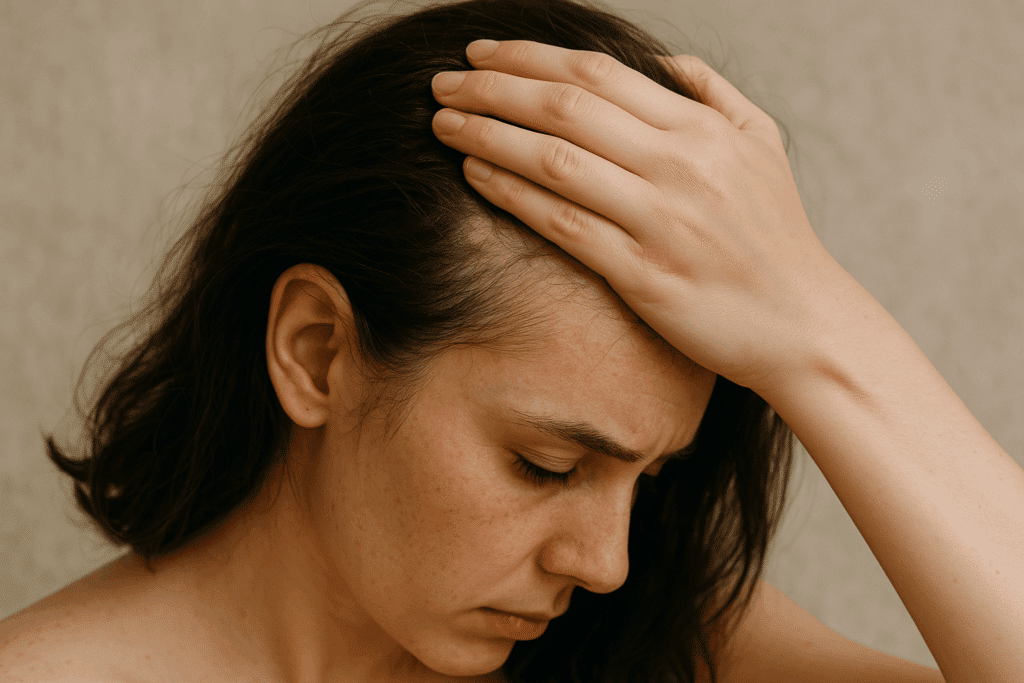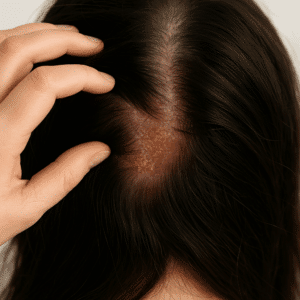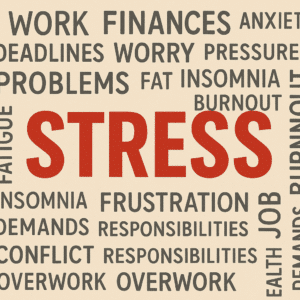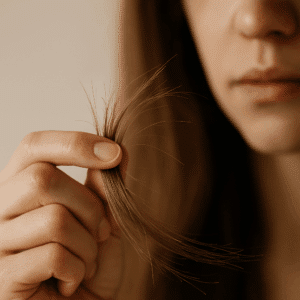Most people understand that stress can affect their body — tight shoulders, poor sleep, or changes in appetite — but few realize it can also impact the scalp.
We see this connection every day. When cortisol (the body’s main stress hormone) remains elevated for too long, it can disrupt the normal function of the scalp and hair follicles.
Cortisol is essential in short bursts — it helps your body respond to immediate challenges. But when life stress becomes chronic, so does cortisol. That imbalance changes how your body distributes energy and nutrients, leading to scalp irritation, shedding, and weaker regrowth over time.
Let’s explore exactly how this happens — and how a trichological scalp analysis can help restore balance and healthier hair.
Cortisol and the Hair Growth Cycle
Hair grows in phases: growth (anagen), transition (catagen), and rest/shedding (telogen).
When cortisol levels stay elevated, the body prioritizes essential organs — like the heart and brain — over nonessential processes such as hair growth.
This hormonal shift pushes hair follicles prematurely into the telogen (resting) phase, leading to telogen effluvium, or stress-related shedding.
- From a trichological perspective: During ScalpCheck® evaluations, we frequently identify patterns consistent with telogen effluvium — often appearing 2–3 months after a major stressor, such as illness, surgery, or emotional trauma. The good news? Once the stressor is identified and the scalp is supported with proper care, this type of hair loss is typically reversible.
How Cortisol Affects Scalp Oil and Microflora
Cortisol doesn’t just influence hair growth — it also impacts the scalp’s oil production and microbial balance.
When stress hormones overstimulate sebaceous glands, oil production increases. That excess oil mixes with sweat, buildup, or styling product residue, creating a perfect environment for irritation, flakes, or itching.
At the same time, this imbalance can disrupt the natural microbiome of the scalp, allowing opportunistic microbes like Malassezia to thrive — often leading to symptoms that mimic dandruff or dermatitis.
- We often tell our guests: “Your scalp is an ecosystem.”
And just like your skin or gut, it reflects what’s happening inside your body. By restoring balance through proper scalp exfoliation, targeted treatments, and stress management, this system can return to harmony.
 Stress, Inflammation, and Scalp Conditions
Stress, Inflammation, and Scalp Conditions
Chronic stress weakens the scalp’s protective barrier, making it more prone to inflammation and sensitivity.
According to Harvard Health, elevated cortisol increases inflammation and slows cellular repair — two key factors behind flare-ups of scalp conditions like dandruff, seborrheic dermatitis, and psoriasis.
At our Cleveland trichology center, we often see this firsthand. Guests who experience prolonged stress frequently report persistent itch, redness, or flaking that resists over-the-counter shampoos. These signs usually indicate deeper inflammation that topical products alone can’t resolve.
- The difference between a temporary scalp issue and a chronic condition often lies in how long the body has been under stress — and whether the scalp has had a chance to recover.
 Cortisol’s Impact on Hair Strength and Quality
Cortisol’s Impact on Hair Strength and Quality
Healthy hair starts with a healthy scalp — but it also depends on circulation and nutrient delivery.
High cortisol constricts blood vessels, reducing oxygen and nutrient flow to follicles. Over time, this can lead to hair that’s weaker, finer, and more prone to breakage.
During ScalpCheck® magnification analysis, we sometimes see thin, brittle strands surrounded by congested or inflamed scalp tissue — a visual sign that stress, not just styling or genetics, is at play.
The good news? Once circulation and nutrient flow are restored, new growth often returns thicker and healthier within a few growth cycles.
How to Support Your Scalp and Lower Cortisol Naturally
While we can’t always remove stress, we can help your body and scalp adapt more effectively.
Simple changes — when paired with professional scalp care — can make a remarkable difference in shedding, irritation, and regrowth.
Try these trichologist-approved habits:
- Prioritize sleep: Quality rest lowers cortisol and supports cellular repair.
- Eat nutrient-dense foods: Include protein, leafy greens, and omega-3s to fuel follicle health.
- Scalp exfoliation: Regular gentle exfoliation promotes circulation and helps regulate oil production.
- Schedule consistent scalp treatments: Professional treatments restore balance faster than at-home care alone.
- Manage stress mindfully: Meditation, deep breathing, or light movement (like yoga) can help regulate cortisol naturally.
When to Seek Professional Help
If you’ve noticed sudden shedding, persistent scalp irritation, or your hair feeling weaker than usual, it’s worth investigating deeper.
A professional scalp analysis can determine whether stress is the root cause — or whether other factors like hormonal changes, nutrition, or buildup are contributing.
Our ScalpCheck® process combines digital magnification, moisture and oil analysis, and trichological expertise to reveal what’s really going on beneath the surface — and how to restore a healthier scalp environment.
Stress may be a part of life, but chronic cortisol imbalance doesn’t have to dictate your hair’s future.
If you’re noticing increased shedding, oiliness, or irritation, it may be your body’s way of signaling it’s time to reset.
Our Cleveland trichology specialists can help identify what’s happening at the scalp level and design a customized plan that supports both your scalp and your peace of mind.
FAQ
Can stress really cause hair loss?
Yes. Chronic stress elevates cortisol, which disrupts the hair growth cycle and can trigger telogen effluvium — a form of temporary shedding.
What is telogen effluvium?
It’s a stress-related condition where hair follicles prematurely enter the resting phase, leading to excess shedding two to three months after a major stressor.
How can I tell if my hair loss is from stress?
A ScalpCheck® analysis can help identify whether shedding is due to stress or other factors like hormones, buildup, or scalp imbalance.
Can stress-related hair loss be reversed?
Yes, in most cases. Once the stressor is managed and the scalp environment is restored, new growth typically resumes within several months.
How can I support my scalp during stressful times?
Prioritize sleep, nutrition, and scalp treatments that promote balance. Regular trichologist visits can help detect and correct issues early.



 Stress, Inflammation, and Scalp Conditions
Stress, Inflammation, and Scalp Conditions Cortisol’s Impact on Hair Strength and Quality
Cortisol’s Impact on Hair Strength and Quality